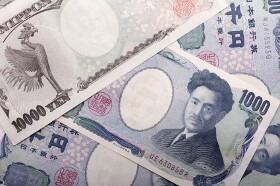The Japanese yen is rising modestly against its counterparts on Friday after new data suggests the countryâs economic recovery is holding steady. But the International Monetary Fund (IMF) issued a report that urged Tokyo to take a breather and not declare victory just yet.
In August, household spending rose 2.8%, beating market forecasts of a 0.1% decline and recording the second consecutive month of gains. This is the fastest annual pace since 2015 as consumers used their large summer corporate bonuses to increase consumption. Retail sales were also up 0.9%.
A tightening labor market has allowed consumers to boost their spending habits, something that is crucial for the Japanese economy since it accounts for about half of its activity. With ballooning domestic demand, analysts say that it could offset potential negative effects from the international trade war and this summerâs natural disasters.
In other economic data, industrial output advanced 0.7% in August, the first production increase in four months. The Ministry of Internal Affairs and Communication (METI) is forecasting that output will surge 2.7% in September and 1.7% in October.
Despite higher spending levels, the Bank of Japan (BOJ) released the results of a survey that found households were more negative about the economy than they were three months ago.
Japan may need to celebrate the good times now because Washington and Tokyo have commenced trade negotiations. President Donald Trump warned last month that US-Japan relations may sour once âI tell them how much they have to pay.â Right now, the White House has proposed 25% tariffs on automobiles, and two-thirds of Tokyoâs trade surplus with the US is due to auto exports.
On Thursday, the IMF argued that there needs to be an overhaul of the nationâs economic policies. In recent years, the worldâs third-largest economy has had to contend with sluggish growth, low inflation, and an aging population. Christine Lagarde, head of the IMF, has recommended a âfresh lookâ at Abenomics, a nickname for Prime Minister Shinzo Abeâs economic initiatives.
We believe that it will require a revamping of policies. The basic principles in our view are still valid but need to be broadened, sustained and accelerated.
The international body predicts a growth rate or 1.1% in 2018 and just 0.9% in 2019.
The USD/JPY currency pair tumbled 0.17% to 113.71, from an opening of 113.90, at 15:09 GMT on Friday. The EUR/JPY dipped 0.02% to 131.15, from an opening of 131.17.
If you have any questions, comments or opinions regarding the Japanese Yen,
feel free to post them using the commentary form below.



Be First to Comment